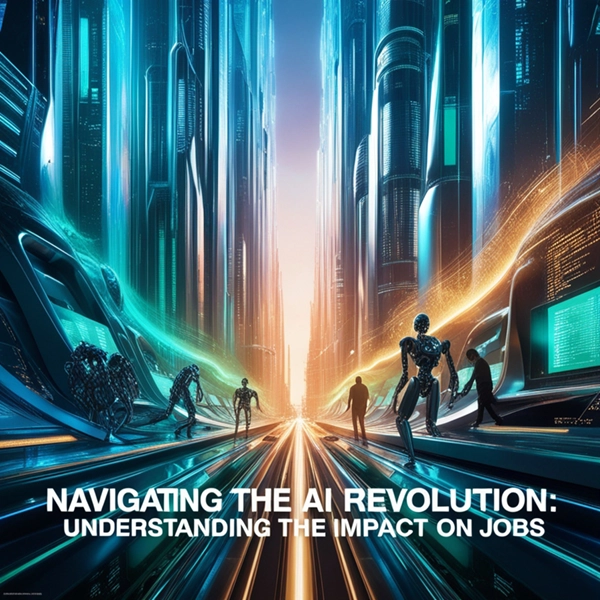At a recent conference where I spoke on AI, I was asked, “Will AI displace me?” My response was simple: “If you don’t learn to work with AI and use the incredible tools that will make many of our jobs easier, allowing us to do more important creative thinking and working – YES!”
You see, the conversation about artificial intelligence (AI) and its impact on the workforce has been ongoing for years, but recent developments have catapulted this issue to the forefront. CNN’s article, “AI is Replacing Jobs Faster Than We Think: What Workers Need to Know,” delves into how AI is transforming job markets globally. As an AI speaker and author, I find this critical and complex topic demanding a nuanced understanding of the interplay between technology and employment.
The Accelerating Pace of Change
The article highlights a key concern: AI is not just replacing routine, manual jobs but is increasingly encroaching on roles that require cognitive skills. This shift is driven by advancements in machine learning and natural language processing, enabling AI systems to perform tasks previously thought to be the exclusive domain of humans. From financial analysis to customer service, AI’s capabilities are expanding rapidly, prompting a re-evaluation of the truly irreplaceable skills.
For example, according to a report by the World Economic Forum, it is estimated that by 2025, 85 million jobs may be displaced by a shift in the division of labor between humans and machines, while 97 million new roles may emerge that are more adapted to this new division.
Industries at the Crossroads
Several industries are experiencing significant disruption:
Manufacturing: AI-powered robots are enhancing production efficiency and reducing the need for human labor. The International Federation of Robotics reports that the operational stock of industrial robots hit a record high of around 2.7 million units globally in 2020, and the numbers have grown exponentially since then.
Service Sector: The rise of chatbots and virtual assistants is a prime example of AI’s encroachment into traditional customer service roles. These AI systems are handling customer inquiries with increasing sophistication, diminishing the demand for human intervention. A Gartner study predicts that by 2025, AI will account for 95% of all customer interactions.
– Creative Fields: AI is making inroads with algorithms capable of generating art, music, and written content. OpenAI’s GPT-3, for instance, has demonstrated an ability to produce human-like text, raising questions about the future of creative professions.
– Healthcare: AI applications in medical diagnostics and treatment planning are invaluable. McKinsey estimates that AI could create $150 billion in annual savings for the U.S. healthcare economy by 2026, yet this also prompts a re-evaluation of the roles of healthcare professionals.
Preparing the Workforce for the Future
CNN’s article emphasizes the importance of upskilling and reskilling the workforce to adapt to these changes. I wholeheartedly agree with this point. The rapid evolution of AI necessitates a proactive approach to education and training. Workers must have skills that complement AI, focusing on areas where human intuition, creativity, and emotional intelligence are not just irreplaceable, but highly valued and essential.
Organizations and educational institutions play a crucial role in this transition. Investment in continuous learning programs and partnerships with tech companies can help bridge the skills gap. Governments, too, have a part to play by creating policies that support workforce development and protect those most vulnerable to job displacement.
A 2021 report by PwC highlights that 77% of CEOs see the availability of critical skills as the biggest threat to their business, emphasizing the need for significant investment in upskilling and reskilling programs.
Ethical Considerations and Societal Impact
While AI’s benefits are undeniable, ethical considerations must not be overlooked. Deploying AI in the workforce raises questions about fairness, privacy, and the potential for bias in algorithmic decision-making. Companies must adopt transparent practices and ensure that AI systems are designed and implemented ethically.
The European Commission’s proposal for AI regulation, introduced in April 2021, aims to address these ethical concerns by establishing a legal framework for trustworthy AI. This includes requirements for transparency, accountability, and human oversight.
Moreover, the societal impact of widespread job displacement cannot be ignored. It is the responsibility of policymakers to address the potential for increased inequality and develop strategies to support those affected by the transition. This includes exploring new economic models, such as universal basic income (UBI), to provide a safety net for displaced workers. By taking these steps, policymakers can reassure the public that their concerns are being heard and acted upon.
A study by the Brookings Institution suggests that UBI could be a viable policy option to mitigate the economic impact of AI-induced job displacement, providing a financial cushion as workers transition to new roles.
Final Thoughts for Now!
The AI revolution presents both opportunities and challenges. A balanced approach that embraces technological advancements while prioritizing human welfare is essential as we navigate this transformative period. CNN’s article’s insights underscore the urgency of this task, reminding us that the future of work is being shaped today.
It’s crucial that we not only adapt to AI but also ensure its ethical deployment, safeguarding against potential biases and privacy infringements.
By staying informed and proactive, we can harness the potential of AI to create a more equitable and prosperous future for all.
Further Reading:
- **Gartner:** AI Customer Experience Trends
- **McKinsey & Company:** The Future of Healthcare
- **European Commission:** Proposal for AI Regulation
- **Brookings Institution:** Universal Basic Income and AI







